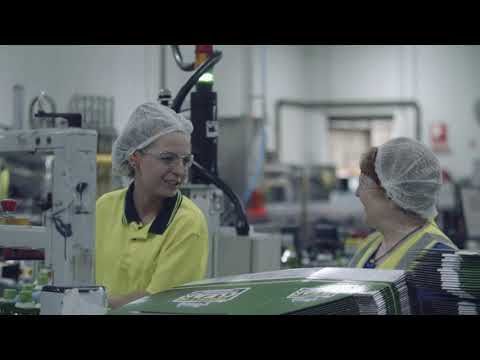Manufacturing resource kit
The manufacturing sector has common factors that can increase the risk of workers developing poor mental health.
Learn what these factors are, how to address them, and what resources you can use to create a mentally healthy workplace.
The importance of mental health in the sector
A mentally healthy workplace provides many benefits to your business. By creating a great place to work, you can boost worker satisfaction, productivity and your bottom line.
Businesses that do not implement actions to ensure staff are mentally safe see lower productivity, as well as increases in unplanned leave, staff turnover and workers compensation claims.
Psychological hazards are a significant issue across the manufacturing sector. This is due to the nature of the work, which requires workers to perform repetitive and monotonous tasks, often in dangerous physical environments, while adhering to tight processes and adapting to frequent organisational change.
How to identify and manage common psychosocial hazards
There are risk factors that are common across the manufacturing sector that can increase the risk of workers developing mental ill-health.
Learn about these factors and what actions you can take to manage them.
High demands, low control
High demands are not always a risk in themselves but can be when combined with low control.
This can be hard to manage in the sector, as work is machine-driven, dictated by rigorous processes and occurs in environments with dangerous equipment, requiring workers to remain alert to prevent physical injuries.
What it looks like
Fatigue
Long periods of concentration are often needed to closely follow detailed tasks and processes. This type of work is to ensure quality standards and prevent physical injuries, however it leads to feelings of tiredness and a reduced ability to deal with stress. As a result, this exposes workers to injuries or near misses.
Lack of task variety
Boredom and feelings that work is 'never-ending' may be created by:
- repetitive and monotonous machine-driven work tasks
- continuous work coming down the production line.
Low control
- A lack of say in how work is done.
- Variable shifts, including seven-day rosters or fly-in/fly-out arrangements.
- Low control over the working environment, e.g., excessive noise, lack of sufficient daylight and limited opportunities for social interaction.
What you can do
Consult with workers on their workloads and seek feedback on changes to make work more easily manageable (e.g., allocate more time/resources to key activities or set clear goals and expectations to help workers prioritise at a task level etc.).
Arrange for workers to rotate to a new task every few hours. This creates opportunities for workers to learn new skills and reduce boredom and fatigue.
Educate workers on the impact of their role in producing the end-product to boost feelings of purpose and their contribution to a larger goal.
Talk to workers when developing rosters. Allow them to provide shift preferences and share feedback on the number of workers needed to meet demands.
Allocate sufficient break times within working hours and provide opportunities for workers to have a say in when they take their breaks.
Check in with your clients to assess and plan for upcoming periods of increased demand.
Provide fatigue management information to all workers and ensure they have access to practical guidance on how to manage fatigue.
Low recognition and reward
Success in this sector is often evaluated based on outputs from the entire manufacturing process (e.g., number of units produced, efficiency of systems and processes etc.).
This can limit opportunities for individuals to feel their work is recognised and rewarded.
What it looks like
Inadequate feedback
- Limited measures of individual success (e.g., sole focus on overall productivity and outputs).
- Lack of, or inadequate, performance feedback.
- Imbalance of employees' efforts with recognition received.
Limited career support
- Lack of opportunity for development (e.g., workers limited to performing a single task every shift).
- Underutilising workers' skills.
- Underpayment or non-payment for overtime hours.
What you can do
Establish policies and practices that acknowledge workers' efforts in a fair and timely way.
Provide regular feedback on performance. Praise workers whenever tasks have been done well or for attributes such as consistency and reliability.
Recognise and reward workers for their ingenuity or effort, not just for their contribution or productivity.
Celebrate team successes, acknowledging an individual’s role in creating the bigger picture.
Use performance reviews as a time to provide positive and constructive advice for future performance, including opportunities for skill development.
Provide workers opportunities for career development such as acting in higher level roles during a superior’s absence.
Consider rotating jobs to broaden their skill set. You could also use coaching/mentoring to widen workers’ interest and motivation.
Use rewards to acknowledge good performance. Consider rewarding workers in areas like upholding safety or supporting change management.
Poor change consultation
The manufacturing sector in Australia is driven by new technological advances. It is one of the top three sectors nationally with the biggest spend on research and development.
Every time businesses adopt new innovations it brings about changes to how work is completed. Poor management of these changes can create risks to workers’ mental health.
What it looks like
Poor communication
Poor communication can lead to uncertainty around workers' job security and role clarity when changes are introduced. It includes:
inadequate consultation and communication with workers about major changes like new software, processes, or rosters
- uncertainty about tasks and work standards, especially if these things are changed frequently
- workers not given an opportunity to provide feedback on changes
- information provided last minute or shared on channels workers do not normally use, leaving workers unprepared.
Low support for workers
- Implementing changes with inadequate training, tools or resources to complete job tasks.
- Insufficient consideration of potential Work Health and Safety (WHS) or performance impacts.
- Making changes that lead to conflicting job roles, responsibilities, or expectations.
What you can do
Provide opportunities for worker consultation before, during and after the change process. Ensure all worker feedback is acknowledged and responded to.
Consider assigning a supervisor to check that all affected workers have reasonable and equal opportunities for feedback and consultation.
Explain the rationale for the change and be upfront about any significant changes that will follow the proposed change.
Keep workers informed throughout the process by establishing effective communications channels, selecting an appropriate spokesperson, and communicating information quickly, to prevent the spread of misinformation.
Develop an effective change management plan with clarity around the responsibility of each employee.
Provide adequate training and resources to help workers understand and be able to carry out changes on the job. Allow time during work hours to review and access these materials.
Introduce a change champion on each shift to enable peer learning and encourage shared ownership of the change.
Analyse the outcomes of that change, considering worker feedback and worker satisfaction throughout the change process.
Make reasonable adjustments for workers who may need extra practical or emotional support during times of organisational change.
Harmful workplace behaviours
The manufacturing sector is diverse, with a large number of migrant workers. It is essential that workplaces actively promote and support diversity and inclusion to help prevent discrimination.
What it looks like
Bullying
Bullying is repeated and unreasonable behaviour directed towards a worker or a group of workers that creates a risk to health and safety. This could be:
- behaving aggressively towards others
- teasing
- playing practical jokes
- pressuring someone to behave inappropriately.
Poor organisational justice
Poor organisational justice includes processes or decisions that are perceived as unfair, including:
- inconsistent application of policies and procedures
- biased decision making
- biased recruitment or promotion of workers (e.g., favouritism or personal connections driving decision-making)
- unfair punitive managers (e.g., ‘one-mistake is the final warning’ approach).
Discrimination
Discrimination is unfair treatment of someone because they have, or are assumed to have, a particular characteristic.
Discrimination also occurs when a rule or requirement that applies to everybody, unfairly disadvantages people who have a particular characteristic (e.g., a person's age, ability, race, gender etc).
What you can do
Develop a policy to set the standard of workplace behaviour and address bullying, discrimination, and harassment.
Provide training to workers on how to prevent and manage workplace bullying.
Establish a process for responding to any complaints about discrimination, bullying, harassment, or poor organisational justice that may arise.
Recognise and celebrate diversity and differences to make everyone feel like they belong, and that work is a safe place to be.
Embed policies and plans into the workplace that address diversity and inclusion.
Encourage social connection and create opportunities for colleagues to get to know each other. Check out icare’s resources for suggestions and tips for supervisors to help build connections at work.
Review workplace procedures to ensure they are unbiased, consistently applied, use accurate information and are open to appeal processes.
Consider utilising fair and consistent templates for managing workplace processes like recruitment, managing pay, and ending employment.
Report more serious incidents to SafeWork NSW. Complete this form to report workplace bullying to SafeWork NSW.
Hear from sector leaders
Central Coast manufacturer TrendPac is a family-owned manufacturer which offers a range of products for personal care, pets and industrial cleaning products.
Following NSW Government workplace mental health training, the organisation shifted their culture and to improve the health and wellbeing of their workers.
Watch TrendPac’s journey to becoming a more mentally healthy workplace.

Creating a mentally healthy workplace – TrendPac
Free training for the manufacturing sector
Sign up to free training tailored for the manufacturing sector, delivered by the Black Dog Institute.

Manufacturing sector resources
Check out these other resources designed for the manufacturing sector to help support good mental health in your workplace:
Listen to the SafeWork NSW podcast series: Safe work leader talks from health and safety leaders in manufacturing.
Join our mailing list
Be the first to hear new announcements, free training, recently published resources and more.